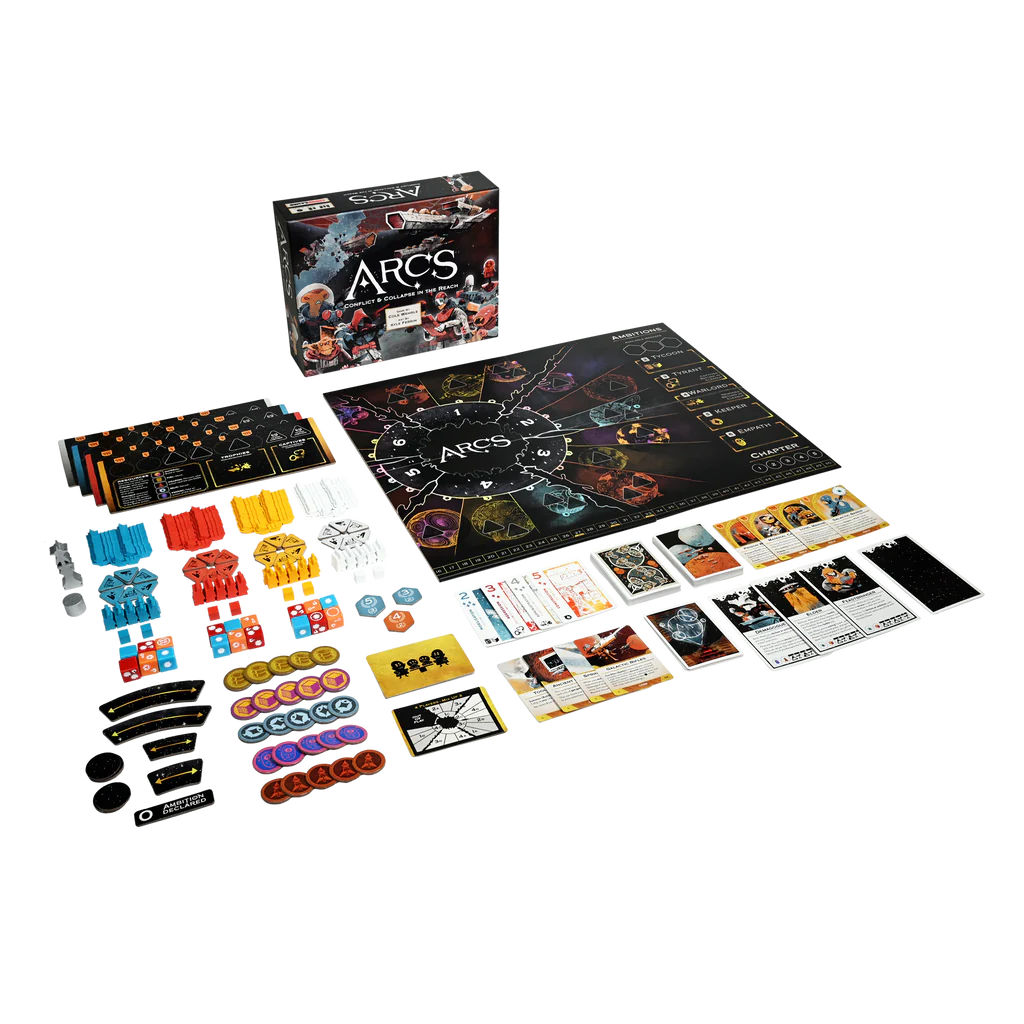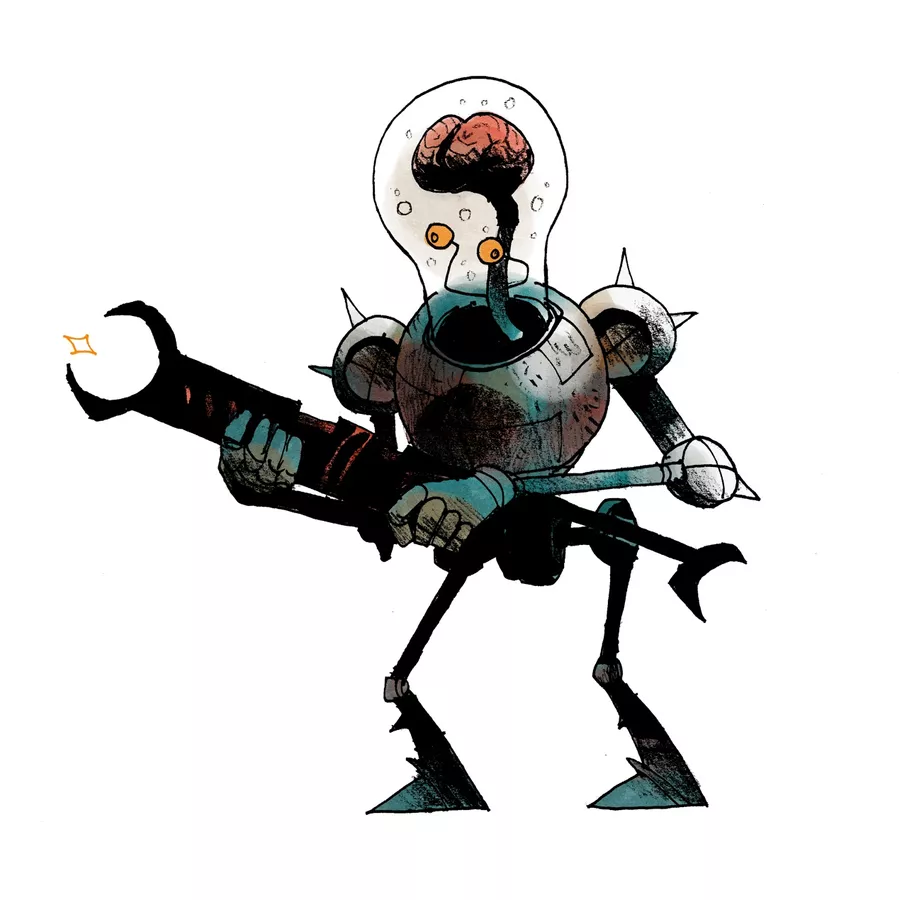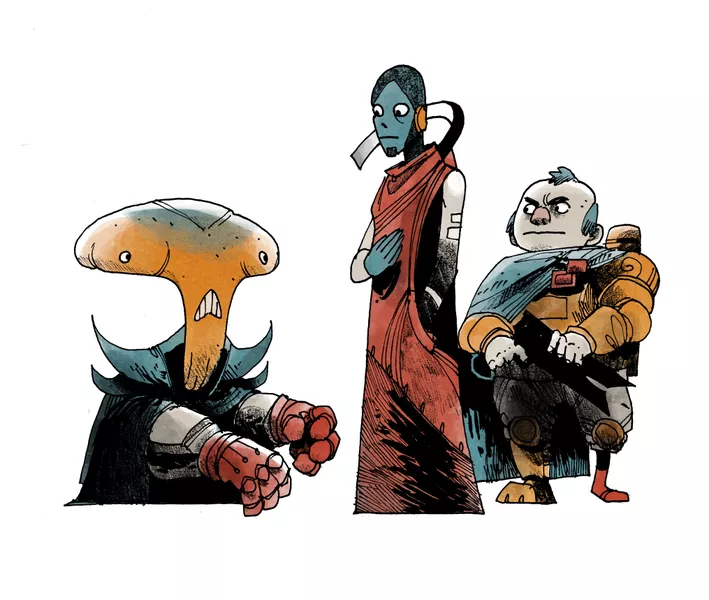Leder Games goes to space with Arcs, a brand new strategy game from design whiz Cole Wehrle. There’s a lot of unpack with Arcs thanks to the base game, Leaders & Lore Pack, and Arcs: The Blighted Reach campaign (that will be getting a full piece of coverage soon), but I wanted to give my impressions after a few games of one of the hottest titles from Leder that’s already (and I think justifiably) in the running for Game of the Year.
What’s In The Box?

- 1 Board
- 4 Player Boards
- 20 Star Ports (5 per player)
- 20 Cities (5 per player)
- 60 Starships (15 per player)
- 40 agents (10 per player)
- 8 Power Markers (2 per player)
- 28 Action cards
- 12 setup cards
- 8 Leader cards
- 25 Guild Cards
- 6 Vox Cards
- 14 Lore Cards
- 25 Resource Tokens (5 each for Material, Fuel, Weapons, Relics, and Psionic)
- 18 Battle Dice (6 each for Assault, Skirmish, and Raid)
- Chapter Marker
- 3 Ambition Markers
- Zero marker
- Initiative Marker
- 4 Path Markers
- 6 Out of Play Markers
- 4 Aid Sheets
You don’t need me to tell you that Arcs looks fantastic because basically everything Kyle Ferrin does looks fantastic. The Alien and Robot designs he’s created for the game are truly unique and oftentimes as strange and otherworldly as they are oddly adorable. Every Leder Game uses a color palette to guide the feel and Arcs uses a very pleasing one that mixes a lot of purple and dark blue with a muted yellow and white. It’s not a shadowy or spooky feel but one that promises much mystery out among the stars.


How’s It Play?
Arcs is built for two different styles of play: single session or campaign. For the sake of this review I’ll be focusing on the single-session version and do a full campaign review down the line. Each player takes on the role of a galactic civilization working to gain more power than your rivals in the battle for the galaxy. To do this you’ll need to stake your ambitions and meet them by conquest, economic power, control of your history, and more.
The game is played over a series of chapters (up to five) and rounds, with Chapter having a number of rounds played and each round composed of one action per player. While the mechanism to take actions in Arcs is fairly standard card playing there is a unique twist that helps it stand out in this regard. In Arcs, the leader with initiative plays their action card and takes the actions as dictated by a number of pips on said card. These tell you whether you can be aggressive, administer your empire, mobilize, or build. Then the other players have to play their own cards in a way that’s similar to a trick taker: match the first card’s suit with a higher number and play the actions on your own card, play a card face down and copy the first card, or play off-suit with your own card but only take ONE action this round. What this does is condense and focus the jockeying for power that is meant to be replicated in a great game for conquest. Who has initiative can and will change throughout the game and its important that you make sure you have a strategy to adapt as your competitors work to accomplish their goals.

Combat is the other big thing in Arcs that helps it stand out. Instead of just doing the normal “move guys, roll dice, big number wins,” Arcs instead gives you three options. You can simply Assault your rival, which will hit hard but cause greater losses for you. You can skirmish with them, which has fewer hits but keeps you safe. And you can Raid (provided you have the resources), which gets your resources and other Goodies from your opponent. Each has its own dice you use with their own changed symbols and probability, helping make the basic combat more strategic without making it overly complex.
The Verdict?

You’ve probably heard a lot about Arcs recently and you’ll no doubt hear more in the coming months. There’s just a LOT packed into the game that is revealed over time and that’s JUST in the single session version. There’s leaders and lore, different agents to explore, and even difficulty options baked right in. But despite all this the game never gets too sprawling, too complicated, too hard to pick up and play for most people. It makes the kind of 4X galactic conquest that’s been a hardcore gaming staple deeply accessible without sacrificing any of the depth. While there is random chance and a bit of a luck of the draw in play here and there, it’s all out in the open and able to be dealt with by savvy enough players. If my first few plays are this good, I can’t wait to see what it looks like when I’ve had it out more and more.
Images via Leder Games
Have strong thoughts about this piece you need to share? Or maybe there’s something else on your mind you’re wanting to talk about with fellow Fandomentals? Head on over to our Community server to join in the conversation!

